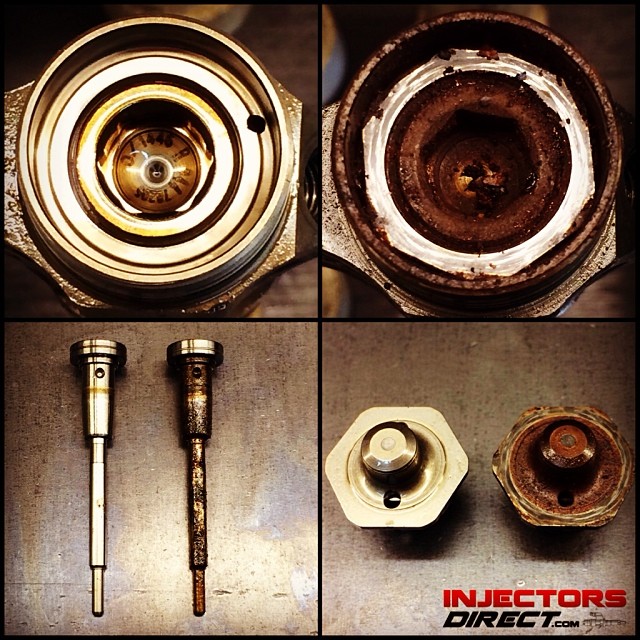Editor’s Note: This is Part 1 in an occasional series about Why Fuel Injectors Go Bad, focusing on the effects low-grade fuel can have on your diesel fuel injectors …


Why do fuel injectors go bad?
Here at Injectors Direct, we get that question a lot, so we’ll be writing about this topic as part of an occasional series to help protect your fuel injectors and identify some of the issues that lead to failure.
There are a number of reasons why diesel fuel injectors go bad or fail, and sometimes it depends on the particular truck or injector we’re talking about.
At Injectors Direct, we specialize in replacing 2001 and up Chevy and GMC Duramax, 2003 and up Dodge Cummins, and 2003 and up Ford Powerstroke. But for the purposes of this post, we’ll focus on one of the top reasons we’ve found fuel injectors go bad: poor fuel quality.
In inspecting the hundreds of damaged injectors we’ve received over the years, and from our own research and in talking with experts in the industry and our own knowledgeable customers, we’ve found that poor fuel in the system is the main reason injectors go bad.
“The biggest reason for fuel injector failure is low-grade fuel,” says Jon Milne, owner of Milne Auto Restoration in Atascadero, Calif. “That’s why a lot of truck owners swear by using premium fuel, low quality or contaminated fuels can corrode and rust the fuel system, which can cause major problems down the road.”
Fuel injectors will fail when debris (water, dirt particles, etc.) or rust find their way into the system and, after time, plug up the nozzle, the armature, or the nozzle needle gets stuck.
To prevent debris from getting into the system, we recommend doing everything you can to help keep your fuel system clean.
- Don’t fill up when a gas station is receiving a new shipment of fuel, as any impurities in the fuel likely haven’t settled in the station’s tanks and could make their way into your truck.
- It’s also a good idea to avoid filling up from portable, job-site type fuel tanks that are more likely to have debris in floating in their tanks.
- When possible, purchase high-quality fuel from reliable stations that are known for their premium fuel — not just the best price.
- Keep your fuel system clean by regularly changing your fuel filters and avoiding aftermarket components that aren’t designed for your particular truck.
- If you keep your truck stored for an extended period, particularly in these winter months, it’s a good idea to fire up your engine occasionally to prevent corrosion of key parts of your fuel system. You should also consider fuel additives designed for stabilizing the fuel in your system.
“You can definitely delay the degradation process by buying high-quality fuel and changing your filters regularly to prevent debris from getting into the system,” Milne said. “That will prevent the injectors from corrosion or getting worn out faster in high mileage situations.”






